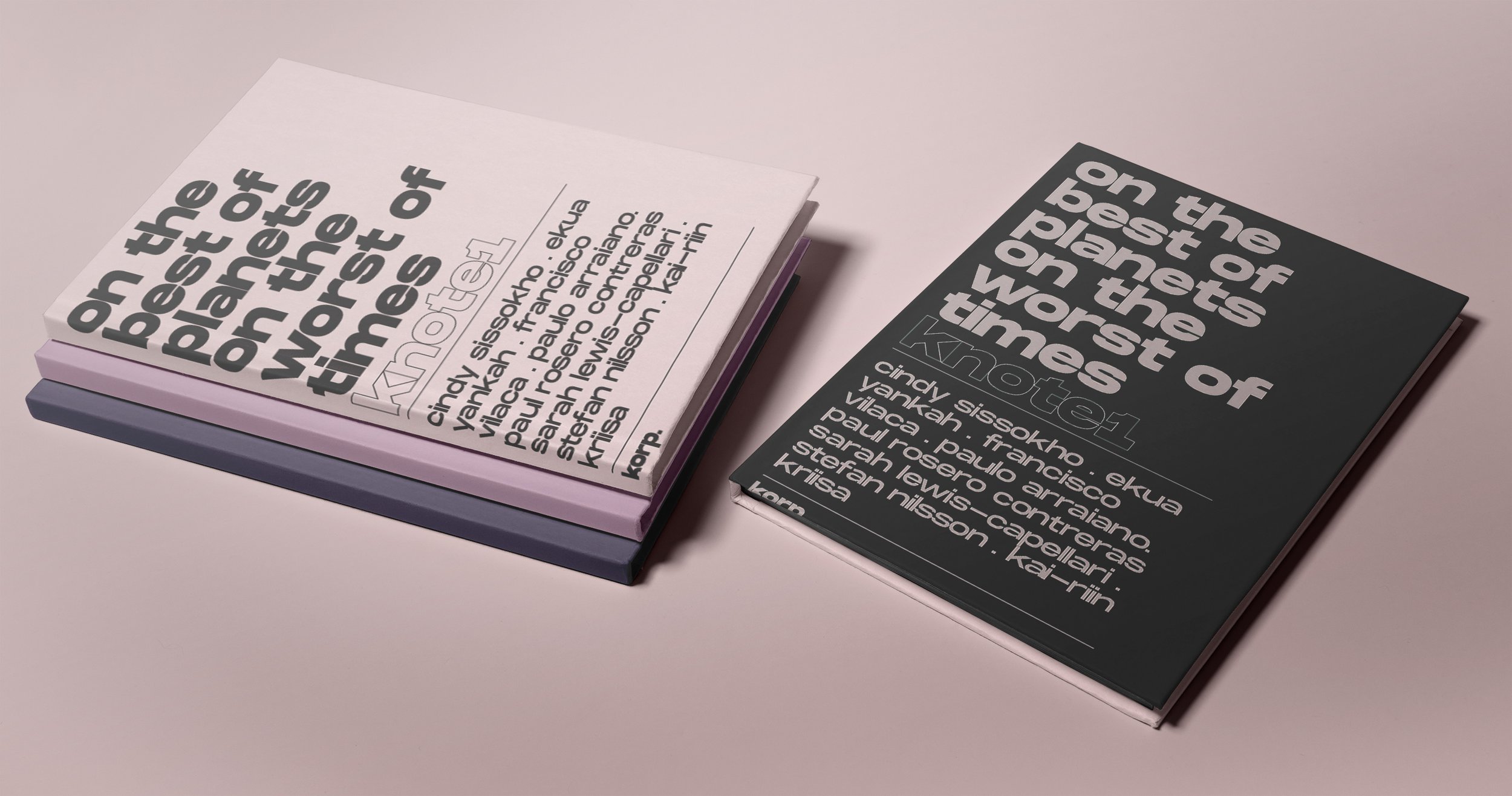
knotes
SERIES OF KEYNOTES FROM KORP PUBLISHING
k-notes [korp keynotes] is an editorial initiative of Korp Publishing that seeks to assemble a series of pocket-format volumes featuring essays and reflections by artists, scholars, scientists, and researchers on themes central to the foundation’s remit: the climate crisis, displacement, digital inequality, fractured supply chains, and contemporary forms of forced labour. Conceived as a portable space for rigorous and critical engagement, the series acknowledges that these crises are entangled, historically produced, and politically charged, demanding sustained interdisciplinary inquiry rather than technocratic solutions.
The inaugural volume, on the best planet, the worst of times, operates as both an introduction and a provisional epilogue to the series. It gathers contributions from the Board of Trustees, the Advisory Board, and the Scientific Committee, offering personal yet analytically grounded reflections on the constellation of issues that will form the foundation’s core concerns. Rather than advancing definitive answers, this edition foregrounds the generative potential of questions: How might we describe environmental catastrophe in ways that resist resignation and mobilise responsibility? In what terms can we address the forced mobility of people when borders become technologies of abandonment and control? What forms of accountability arise when the infrastructures that sustain life are themselves sites of exploitation and extraction?
This project insists on the necessity of unsettling disciplinary enclosures. By placing artistic practice in dialogue with social and natural sciences, k-notes recognises that the production of knowledge is never neutral but always embedded in power relations, histories of dispossession, and contested imaginaries of the future. The choice of a pocket format is not incidental but a deliberate gesture toward accessibility without simplification—a means of carrying difficult questions beyond institutional settings and into broader publics, including those directly implicated in these crises.
k-notes is therefore conceived not merely as a publishing series but as a critical apparatus for collective thought and intervention. With on the best planet, the worst of times, Korp Publishing signals a commitment to cultivating a public culture attuned to the complexity and violence of contemporary crises, while remaining equally committed to the ethical and political obligation to imagine otherwise. By foregrounding the voices shaping the foundation’s intellectual orientation, this first volume models a form of engaged scholarship that refuses abstraction divorced from struggle, and that understands critique itself as a mode of solidarity.
knote1
edited by korp publishing
about korp found
ation
korp Foundation for Arts and Science is an international platform for artistic research, critical thinking, and systemic advocacy. Founded by philanthropist and art patron Stefan Nilsson, Korp serves as a living laboratory and academy - both conceptual and physical - uniting artists, curators, scientists, and researchers across disciplines and geographies. Together, we explore and respond to the most pressing challenges of our time: the accelerating climate and ecological crisis, deepening inequalities between north and south, systemic economic fragility, and the urgent need to radically, as agents of change reimagine how we live, create, and connect.
The foundation works as a laboratory of investigation and action through geographical acupuncture in the field of culture, science and education, promoting residency programs, exhibitions, academic programs and scientific research as well as fostering deep connections and community engagement.
Korp foundation is committed to questioning the structures that uphold exploitation, whether through digital inequality, fractured supply chains, or modern forms of forced labor, while elevating art as a central force in shaping new narratives and new systems. At the heart of our work is the belief that artistic conceptual thinking is not peripheral to progress, it is its engine.
Our flagship is to develop, to question, to influence, and to inspire transformation in pursuit of diversity, coexistence, and a more just, sustainable future.
Impact, rethought
korp foundation acknowledges that we are still navigating a world predominantly shaped by material wealth and capital-driven systems. Rather than reject these forces, we choose to recode them. Through our dedicated Seed Investment Programme, we support early-stage ventures that are committed to impact, those who dare to align profitability with planetary stewardship, social equity, and regenerative design.
korp foundation acts as a shapeshifter within the economic landscape, reimagining capital not as an end, but as a tool for healing and transformation. We channel resources toward companies that address climate change, engage in socially conscious practices, and are fundamentally dedicated to systemic change. In this emerging paradigm, the planet is no longer a silent backdrop to human progress - it becomes the primary stakeholder in every decision.
By providing catalytic funding, mentorship, and access to a global network of thinkers and makers, we empower entrepreneurs who carry the courage and vision to rewire the DNA of business. We believe that capital can be conscious, that profit can be purposeful and that a future rooted in justice and collaboration is possible.
